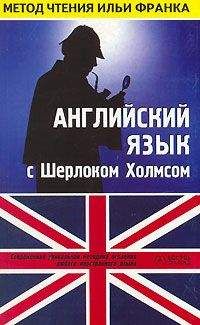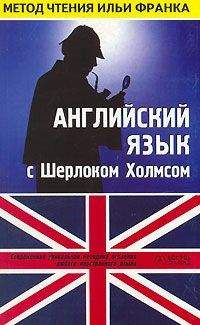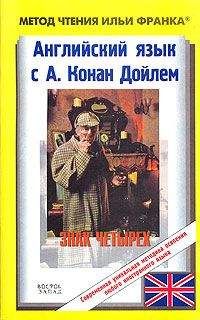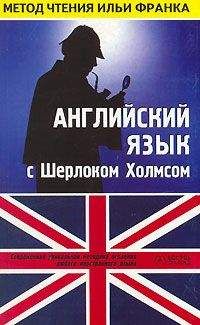“He was rattled and bustled by meeting this other fellow (он был ошеломлен встречей с тем другим человеком /убитым/; to rattle — трещать, грохотать; волновать, пугать; смущать, приводить в замешательство; to bustle — торопиться, спешить; суетиться; bustle — суматоха, суета; to meet — встретить/ся/). He hardly knew what he was doing (он едва ли понимал, что делает).”
“Well, that’s likely enough (что ж, это вполне вероятно). But I wish to call your attention very particularly to the position of this house (однако я особенно хочу обратить ваше внимание на местоположение дома; to call — звать; звонить; призывать, привлекать; particularly — очень, чрезвычайно; детально, подробно), in the garden of which the bust was destroyed (в саду которого был разбит бюст).”
Lestrade looked about him (Лестрейд оглянулся вокруг).
“It was an empty house (это был пустой дом), and so he knew that he would not be disturbed in the garden (и поэтому он /преступник/ знал, что его не потревожат в саду).”
suggestive [ [email protected]'dZestIv], possession [ [email protected]'zeS(@)n], human ['hju: [email protected]], bustled [bVsld], destroyed [dIs'trOId]
“We have a long way to go yet,” said he. “And yet — and yet — well, we have some suggestive facts to act upon. The possession of this trifling bust was worth more, in the eyes of this strange criminal, than a human life. That is one point. Then there is the singular fact that he did not break it in the house, or immediately outside the house, if to break it was his sole object.”
“He was rattled and bustled by meeting this other fellow. He hardly knew what he was doing.”
“Well, that’s likely enough. But I wish to call your attention very particularly to the position of this house, in the garden of which the bust was destroyed.”
Lestrade looked about him.
“It was an empty house, and so he knew that he would not be disturbed in the garden.”
“Yes, but there is another empty house farther up the street (да, но есть и другой пустой дом /дальше/ на этой улице) which he must have passed (мимо которого он, должно быть, прошел) before he came to this one (прежде чем дошел до этого дома). Why did he not break it there (почему он не разбил бюст там), since it is evident that every yard that he carried it (поскольку ясно, что каждый ярд, который он нес бюст) increased the risk of someone meeting him (увеличивал опасность того, что кто-то встретит его = опасность встречи с кем-либо)?”
“I give it up (не берусь объяснить; to give up — бросать /привычку/, оставлять; сдаться, отказаться от дальнейших попыток),” said Lestrade.
Holmes pointed to the street lamp above our heads (Холмс указал на уличный фонарь над нашими головами).
“He could see what he was doing here (здесь он мог видеть /то/, что делает), and he could not there (а там не мог). That was his reason (это было его соображением = причиной прийти сюда).”
“By Jove (черт побери; by Jove — клянусь Юпитером!; ей-богу!, честное слово!, черт побери! /восклицание, выражающее удивление, досаду и т. п./)! that’s true (/а ведь/ верно; true — верный, правильный; точный),” said the detective. “Now that I come to think of it (теперь я вспоминаю; to come to think of it — подумав, если вдуматься, подумать только), Dr. Barnicot’s bust was broken not far from his red lamp (бюст доктора Барникота был разбит недалеко от его красного фонаря; red lamp — красный фонарь /горящий ночью около дома врача или у дверей аптеки/). Well, Mr. Holmes, what are we to do with that fact (но что, мистер Холмс, нам делать с этим фактом)?”
“To remember it — to docket it (запомнить его, внести в протокол; to docket — вести досье судопроизводства, вести книгу записей по делу; вносить краткое содержание дела в книгу, в реестр). We may come on something later (впоследствии мы можем наткнуться на что-нибудь; to come on — наступать, надвигаться; делать успехи; наткнуться; later — позже, впоследствии, позднее) which will bear upon it (что будет иметь отношение к этому /факту/; to bear /up/on — иметь отношение к, касаться чего-либо). What steps do you propose to take now, Lestrade (какие шаги вы намерены предпринять теперь, Лестрейд; to take steps — предпринять шаги, принять меры; to propose — намереваться, собираться, предполагать)?”
above [@'bVv], reason ['ri:z(@)n], detective [dI'tektIv]
“Yes, but there is another empty house farther up the street which he must have passed before he came to this one. Why did he not break it there, since it is evident that every yard that he carried it increased the risk of someone meeting him?”
“I give it up,” said Lestrade.
Holmes pointed to the street lamp above our heads.
“He could see what he was doing here, and he could not there. That was his reason.”
“By Jove! that’s true,” said the detective. “Now that I come to think of it, Dr. Barnicot’s bust was broken not far from his red lamp. Well, Mr. Holmes, what are we to do with that fact?”
“To remember it — to docket it. We may come on something later which will bear upon it. What steps do you propose to take now, Lestrade?”
“The most practical way of getting at it (наиболее целесообразный способ разобраться с делом = целесообразнее всего; practical — практический; целесообразный, осуществимый; to get at — добраться; понять, осознать; выяснить: it is always difficult to get at the truth — выяснять правду/добраться до правды всегда нелегко), in my opinion (по моему мнению), is to identify the dead man (установить личность убитого). There should be no difficulty about that (это не должно представлять трудности). When we have found who he is (когда мы узнаем, кто он) and who his associates are (и кто его товарищи; associate — товарищ, коллега; сообщник; to associate — /при/соединять/ся/; взаимодействовать; водиться /с кем-либо/), we should have a good start in learning (будет намного легче выяснить; start — старт, начало; преимущество; to make a good start — положить хорошее начало, удачно начать) what he was doing in Pitt Street last night (что он делал на Питт-стрит прошлой ночью), and who it was who met him (кто его встретил) and killed him on the doorstep of Mr. Horace Harker (и убил на пороге /дома/ мистера Хораса Харкера). Don’t you think so (вы так не считаете)?”
“No doubt (несомненно); and yet it is not quite the way in which I should approach the case (однако это не совсем тот способ, с которым я бы подошел к решению этого дела = я бы подошел к решению этого дела по-другому; to approach — приближаться; approach — приближение; подход /к решению проблемы, задачи/).”
“What would you do then (что бы вы сделали)?”
“Oh, you must not let me influence you in any way (о, вы не должны позволять мне влиять на вас каким бы то ни было образом). I suggest that you go on your line and I on mine (предлагаю вам идти своим путем, а я пойду своим; line — строка; веревка; направление, курс). We can compare notes afterwards (впоследствии мы можем сравнить /полученные/ сведения; to compare notes: «сравнивать заметки» — обмениваться мнениями, впечатлениями, наблюдениями, сведениями), and each will supplement the other (и один: «каждый» дополнит другого; supplement — добавление, дополнение).”
“Very good (отлично),” said Lestrade.
associate [@' [email protected]], doubt [daut], influence [' [email protected]], suggest [ [email protected]'dZest]
“The most practical way of getting at it, in my opinion, is to identify the dead man. There should be no difficulty about that. When we have found who he is and who his associates are, we should have a good start in learning what he was doing in Pitt Street last night, and who it was who met him and killed him on the doorstep of Mr. Horace Harker. Don’t you think so?”
“No doubt; and yet it is not quite the way in which I should approach the case.”
“What would you do then?”
“Oh, you must not let me influence you in any way. I suggest that you go on your line and I on mine. We can compare notes afterwards, and each will supplement the other.”
“Very good,” said Lestrade.
“If you are going back to Pitt Street (если вы /сейчас/ возвращаетесь на Питт-стрит), you might see Mr. Horace Harker (/то/ можете увидеть мистера Хораса Харкера). Tell him for me that I have quite made up my mind (скажите ему от моего имени, что я вполне принял решение; to make up one's mind — принять решение, решиться /на что-либо или сделать что-либо/), and that it is certain that a dangerous homicidal lunatic (и несомненно, что опасный, одержимый мыслью об убийстве сумасшедший; homicidal — убийственный; одержимый мыслью об убийстве /о душевнобольном/), with Napoleonic delusions (одержимый манией наполеононенавистничества; delusion — обман, заблуждение; мания; бред, бредовые идеи), was in his house last night (был в его доме прошлой ночью). It will be useful for his article (это будет полезно для его статьи).”
Lestrade stared (Лестрейд изумленно взглянул /на Холмса/; to stare — пристально глядеть, вглядываться; уставиться; смотреть в изумлении /на кого-либо/что-либо/).
“You don’t seriously believe that (вы ведь всерьез не верите в это = неужели вы действительно верите в это)?”
Holmes smiled (Холмс улыбнулся).
“Don’t I (верю ли я)? Well, perhaps I don’t (возможно, не верю). But I am sure that it will interest Mr. Horace Harker (но я уверен, что это /такая версия/ заинтересует мистера Хораса Харкера) and the subscribers of the Central Press Syndicate (и подписчиков Центрального информационного агентства). Now, Watson, I think that we shall find (итак, Ватсон, думаю, мы обнаружим) that we have a long and rather complex day’s work before us (что нам предстоит долгая и довольно сложная работа дня = весьма хлопотливый день; before — до, раньше; впереди, перед /указывает на что-либо предстоящее/: your whole life is before you — у тебя вся жизнь впереди). I should be glad, Lestrade (я буду рад, Лестрейд), if you could make it convenient to meet us at Baker Street (если вы сможете зайти к нам: «найдете удобным навестить нас» на Бейкер-стрит; convenient — удобный, подходящий) at six o’clock this evening (в шесть часов этим вечером). Until then I should like to keep this photograph (до тех пор я хотел бы оставить у себя эту фотографию), found in the dead man’s pocket (найденную в кармане убитого; to find).





